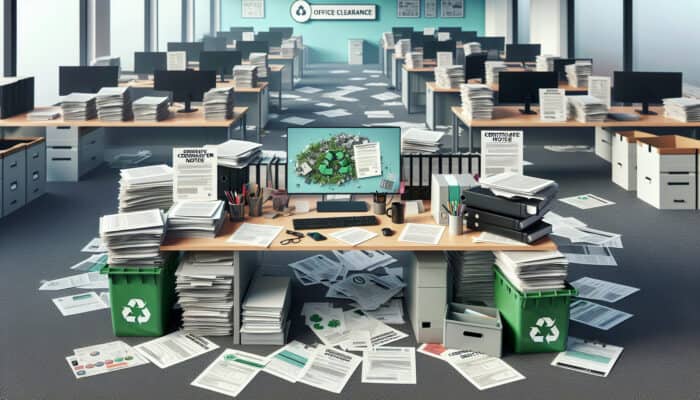Comprehensive Guide to UK Office Clearance Regulations
Understanding Legal Obligations for Office Clearances

Clearing a UK Office as a Novice: Navigating the intricacies of clearing a UK office as a novice requires a thorough understanding of the legal obligations surrounding waste disposal and data protection. The Waste (England and Wales) Regulations 2011 outline the responsibilities that businesses must comply with regarding waste management. This legislation mandates that all organisations must ensure their waste disposal methods are responsible, minimising the risk of contamination and environmental damage. Complying with proper waste disposal not only aligns with legal requirements but also enhances a company’s reputation and commitment to sustainability.
Additionally, the General Data Protection Regulation (GDPR) and the Data Protection Act 2018 impose stringent guidelines on the handling of personal data. During office clearance, it is vital to ensure that any documents containing personal or sensitive information are managed properly. This includes securely shredding confidential paperwork and ensuring that electronic devices are thoroughly wiped of data. Failure to comply can result in significant fines and tarnish a business’s reputation.
Acquainting yourself with these legal requirements is essential. Engaging in training sessions or consulting with waste management experts can provide valuable insights into the specific laws applicable to different types of office materials. By remaining informed, you can confidently execute a clearance that adheres to all legal obligations, ensuring a smooth and compliant process.
Prioritising Environmental Responsibility in Office Clearances
The environmental ramifications of any office clearance are a crucial consideration, particularly in today’s eco-conscious landscape. Clearing a UK office as a novice should involve thorough awareness of the UK’s environmental regulations, such as the Environmental Protection Act 1990. This legislation governs waste management practices and establishes a framework designed to reduce the ecological footprint of businesses.
Implementing environmentally responsible practices during the clearance process not only aids in legal compliance but also significantly contributes to sustainability objectives. For instance, recycling materials like paper, plastics, and electronics diminishes landfill waste and conserves valuable resources. As businesses face increasing scrutiny regarding their environmental impact, integrating sustainability into the clearance process can enhance public perception and foster customer loyalty.
Furthermore, collaborating with local recycling initiatives or charities can ensure that usable items are redirected from landfills. This not only benefits the local community but also aligns with the UK’s ambitions for a circular economy, which aims to keep resources in use for as long as possible. Understanding these elements will empower you to approach the clearance in a manner that respects environmental considerations while fulfilling your legal obligations.
Implementing Safety Protocols During Office Clearance
Safety must be a top priority when clearing a UK office as a novice. Adhering to health and safety regulations is not merely a legal obligation but also a moral responsibility aimed at safeguarding the well-being of everyone involved in the clearance process. The Health and Safety at Work Act 1974 outlines the responsibilities of employers to maintain a safe working environment.
During office clearance, particular attention should be directed towards potential hazards associated with lifting heavy items, handling electronic waste, and managing hazardous materials, such as old batteries or chemicals. Providing adequate training for staff involved in the clearance, ensuring they are equipped with the necessary personal protective equipment (PPE), and following safe manual handling techniques can significantly mitigate these risks.
Additionally, conducting a comprehensive risk assessment before commencing the clearance is vital. This should identify potential hazards and outline procedures for managing them effectively. By prioritising safety and adhering to established protocols, you will create a secure environment that fosters a culture of responsibility extending beyond the clearance process.
Importance of Documentation and Reporting in Office Clearances

Thorough documentation is an essential component throughout the office clearance process. Clearing a UK office as a novice requires maintaining accurate records to comply with regulations and facilitate any future audits or inspections. Documenting each phase of the clearance provides a safety net, ensuring that all actions taken are transparent and justifiable.
This documentation should encompass various elements, including waste transfer notes when disposing of commercial waste, certificates of destruction for confidential documents, and records of any items donated or recycled. These documents not only demonstrate compliance but can also provide crucial information for evaluating the effectiveness of the clearance process.
Moreover, maintaining these records can help identify trends over time, such as recurring types of waste generated, which can inform future waste reduction strategies. By implementing a robust documentation system, you enhance accountability and ensure that future office clearances are even more efficient and compliant, thereby supporting your organisation’s commitment to responsible waste management.
Strategising for the Office Clearance Process
Conducting a Comprehensive Assessment of Office Contents
The initial step in effectively clearing a UK office as a novice is to conduct a detailed assessment of the office contents. This initial inventory is critical for planning the clearance process efficiently. Start by categorising items into several groups: keep, recycle, donate, sell, and dispose. This methodical approach simplifies the clearance while ensuring that decisions are made thoughtfully and strategically.
When assessing office contents, consider the condition and value of each item. For example, office furniture in good condition may be suitable for resale or donation, while outdated technology should be earmarked for responsible disposal or recycling. Engaging employees in this process can also be beneficial; they may have valuable insights into which items are essential and which can be discarded without issue.
Additionally, leverage inventory management tools or spreadsheets to track these items and their respective categories effectively. This practice provides a comprehensive overview of the assets held within the office, aiding in the formulation of a clear strategy for clearance and ultimately leading to a more organised and efficient process.
Creating an Effective Clearance Schedule

Establishing a structured timeline is crucial when clearing a UK office as a novice. A well-organised schedule not only keeps the process on track but also minimises disruption to regular business operations. Begin by setting clear start and end dates for the clearance, breaking down the process into manageable phases for better oversight and control.
Consider the potential impact on staff and clients. Ideally, the clearance should occur during off-peak hours or over a weekend to minimise interruptions. Allocating specific days for sorting, packing, and disposing of items can help maintain momentum and ensure the clearance is efficient and focused.
Moreover, communicate the schedule clearly to all stakeholders involved, including staff members, clearance teams, and any external companies contracted for disposal. Transparency during the process fosters cooperation and can lead to a smoother transition throughout the clearance, ensuring everyone is on the same page.
Allocating Resources for a Successful Clearance
The success of clearing a UK office as a novice hinges on the proper allocation of resources. Begin by assessing the tools and equipment required for the clearance. This may include packing materials, transport vehicles, and any necessary cleaning supplies to ensure efficient operations.
Furthermore, consider the workforce needed for the clearance. Depending on the office size and the volume of items to be cleared, this may involve enlisting help from employees or hiring professional clearance services. Understanding the scope of the task will inform whether you need to contract external assistance or if the clearance can be managed in-house effectively.
Implementing a budget for the clearance process is equally important. This should encompass costs for disposal fees, recycling services, and any additional resources procured. By wisely allocating your resources, you can ensure a seamless clearance experience that remains within budgetary constraints while achieving your objectives.
Sorting and Categorising Office Items
Identifying Items for Reuse and Repurposing
A significant component of clearing a UK office as a novice is recognising items that can be reused or repurposed. This practice not only promotes sustainability but can also save the business costs. Start by evaluating furniture, equipment, and supplies that may still hold value either for the office or for others.
Consider donating items that are in good condition to local charities or community organisations. Many groups welcome office furniture and supplies that can enhance their operations. This practice not only reduces waste but also fosters positive community relations and may provide tax benefits for the business, supporting corporate social responsibility initiatives.
Additionally, assess whether certain items can be repurposed within the office. For instance, outdated but functional electronics may be refitted for specific roles, or old stationery supplies can be redistributed for use in other departments. By prioritising reuse, you minimise waste and contribute to a more sustainable office environment, aligning with broader sustainability goals.
Responsible Management of Electronic Waste
Handling electronic waste responsibly is crucial when clearing a UK office as a novice. The UK has stringent regulations governing electronic waste, primarily outlined in the Waste Electrical and Electronic Equipment (WEEE) Regulations. Understanding these regulations is essential to ensure compliance and protect the environment.
Begin by identifying all electronic items that require disposal, such as computers, printers, and telephones. It is vital to avoid simply discarding these items, as they often contain hazardous materials that can harm the environment if not disposed of properly. Engaging a licensed waste management company that specialises in electronic waste can facilitate the safe disposal or recycling of these items, ensuring compliance with legal standards.
Moreover, consider the potential for data breaches when disposing of electronic devices. Ensuring that all data is securely wiped or that devices are physically destroyed before disposal is a mandated practice under data protection laws. By adopting these practices, you not only comply with legal requirements but also protect your business from potential data security issues, thereby reinforcing trust among clients and stakeholders.
Proper Handling of Confidential Documents
The management of confidential documents is a critical aspect when clearing a UK office as a novice. Given the stringent data protection laws in the UK, it is essential to handle sensitive documents with the utmost care to prevent data breaches and avoid legal repercussions.
Start by identifying all confidential documents that require special treatment, such as employee records, financial information, and proprietary company data. Securing these documents until they can be disposed of correctly is paramount to maintaining compliance and safeguarding sensitive information.
When it comes to destruction, employing a professional shredding service can ensure compliance with data protection regulations. These services often provide certificates of destruction, which serve as proof that sensitive documents have been securely disposed of. Additionally, consider implementing a document retention policy to streamline the management of confidential documents in the future, ensuring that sensitive information is handled appropriately at all times.
Disposal and Recycling Strategies in the UK
Selecting Appropriate Disposal Services for Office Waste
Choosing the right disposal services is critical when clearing a UK office as a novice. The selection of a reputable service provider can significantly influence the efficiency and compliance of the clearance process. Begin by researching waste management companies within the UK that specialise in commercial waste disposal to ensure you find a reliable partner.
Consider key factors such as the company’s reputation, certifications, and compliance with environmental regulations. Engaging a registered waste carrier guarantees that your waste is disposed of in a manner compliant with UK laws and minimises environmental impact. Furthermore, reading reviews and soliciting recommendations can help you identify reputable providers within the market.
It may also be advantageous to seek companies that offer a comprehensive range of services, including recycling and electronic waste disposal. This holistic approach can simplify the clearance process and reduce the need to engage multiple service providers, ultimately leading to a more streamlined and effective clearance experience. Choosing the right disposal service is an investment in compliance and sustainability.
Prioritising Recycling of Office Materials
In the context of clearing a UK office as a novice, prioritising recycling is essential for minimising waste and promoting environmental responsibility. The UK is making significant strides towards a more sustainable future, and engaging with local recycling facilities can play a pivotal role in this effort, contributing to broader sustainability goals.
Identify materials that can be recycled during the clearance process, including paper, plastics, metal, and electronics. Establishing a relationship with local recycling centres can streamline the disposal of these materials, ensuring they are repurposed effectively rather than sent to landfill. Many recycling centres offer dedicated collection services for businesses, making it easier to manage this aspect of the clearance efficiently.
Moreover, consider implementing a recycling policy within the office to promote ongoing sustainability initiatives. Educating employees about proper recycling practices can foster a culture of environmental responsibility that extends beyond the clearance process and into everyday office operations, thus embedding sustainability into the organisational culture.
Safe Disposal of Hazardous Materials
The disposal of hazardous materials is a critical consideration when clearing a UK office for the first time. Many offices may contain items such as old batteries, chemicals, or outdated electronics, which can pose risks to both health and the environment if not handled correctly.
Familiarise yourself with the UK regulations surrounding hazardous waste, particularly the Hazardous Waste Regulations 2005. Identifying hazardous materials during the clearance process is essential, and these items should be segregated from regular waste immediately to prevent any risk of contamination or harm.
Consulting with waste management professionals who specialise in hazardous waste disposal is advisable. These experts can provide guidance on proper handling, transportation, and disposal methods to ensure compliance and safety. By taking these precautions, you protect both your employees and the environment during the office clearance, thereby upholding your organisation’s commitment to responsible waste management.
Grasping UK Waste Regulations for Compliance
A comprehensive understanding of UK waste regulations is crucial when clearing a UK office as a novice. The regulatory framework governing waste management can be complex, but familiarising yourself with these laws is crucial for compliance and sustainability.
The primary legislation includes the Environmental Protection Act 1990 and the Waste (England and Wales) Regulations 2011, which outline the responsibilities of businesses regarding waste disposal. These regulations mandate that all waste is managed in a manner that prevents harm to human health and the environment, ensuring accountability in waste management.
In addition to understanding these overarching laws, being aware of local council regulations is essential, as waste disposal guidelines can vary by locality. Engaging with local authorities or waste management professionals can provide clarity on disposal requirements specific to your area. By adhering to these regulations, you can avoid penalties and make a positive contribution to both the community and the environment.
Supporting a Circular Economy Through Office Clearance
Embracing the principles of a circular economy is integral to setting up a UK office as a novice. The circular economy framework advocates for reducing waste and maximising the reuse of resources, aligning perfectly with contemporary sustainability goals.
During the office clearance process, prioritise practices that support reuse and recycling. This involves not only disposing of items responsibly but also considering how to extend the life cycle of office materials. For example, instead of discarding old furniture, consider exploring refurbishment options or donating it to local charities to benefit the community.
Beyond the immediate clearance, fostering a culture of sustainability within the office can contribute to a circular economy in the long term. This may include establishing systems for ongoing recycling, encouraging eco-friendly purchasing decisions, and implementing waste reduction strategies. By promoting these practices, you position your office as a champion of sustainability, contributing to the UK’s broader circular economy ambitions while enhancing your organisation’s reputation.
Engaging Professional Clearance Services for an Efficient Process
Conducting Thorough Research on UK Clearance Companies
When clearing a UK office as a novice, conducting thorough research and selecting reputable clearance companies is paramount. The extensive range of services offered by professional clearance companies can facilitate a smoother and more efficient clearance process, ensuring compliance and effectiveness.
Begin by compiling a list of potential companies, taking into account factors such as experience, customer reviews, and the specific services they offer. Look for companies that specialise in office clearances and have a proven track record of compliance with UK regulations. Engaging with local businesses may provide added benefits, such as knowledge of regional waste disposal practices and a more personalised service.
Requesting quotes and comparing services is essential for determining the best fit for your specific clearance needs. Transparency in pricing and service agreements can prevent misunderstandings and ensure that the chosen company aligns with your budget and expectations, thereby facilitating a successful partnership.
Understanding the Details of Service Agreements
Understanding the specifics of service agreements is crucial when relocating a UK office as a novice. These agreements outline the terms and conditions of the services provided by clearance companies and are a vital component of the decision-making process.
Thoroughly review service agreements to understand what is included in the quoted price. Look for details regarding waste disposal methods, recycling practices, and any additional fees that may arise during the clearance process. It’s essential to ensure that the chosen company complies with UK regulations, particularly those related to data protection and hazardous waste management.
Understanding the cancellation terms and conditions is equally important. If unforeseen circumstances arise, having clarity on the cancellation policy can save time and prevent potential costs. Secure service agreements that offer flexibility and transparency, ensuring a smoother and more streamlined clearance experience.
Coordinating Effectively with Clearance Teams
Effective coordination with clearance teams is essential when clearing a UK office as a novice. Establishing clear lines of communication with the professional team can greatly enhance the efficiency of the clearance process, minimising the likelihood of misunderstandings and ensuring a successful outcome.
Before the clearance begins, organise a briefing session with the clearance team to discuss the scope of work, timelines, and any specific requirements. This collaboration fosters mutual understanding and establishes clear expectations for both parties involved. Regular check-ins during the clearance can ensure that any issues are addressed promptly and efficiently, maintaining momentum throughout the process.
Encouraging feedback from the clearance team can also provide valuable insights. Their experience can highlight potential pitfalls and suggest improvements for future clearances. By fostering a collaborative environment, you enhance the overall effectiveness of the office clearance and build stronger partnerships with service providers.
Post-Clearance Strategies for Continued Compliance and Improvement
Documenting the Office Clearance Process Thoroughly
Maintaining comprehensive records after clearance is vital for establishing a UK office as a novice. Documentation serves as proof of compliance with legal obligations and provides a reference point for future projects, reinforcing your organisation’s commitment to responsible waste management.
Ensure that all records related to the clearance are organised and stored securely. This includes waste transfer notes, certificates of destruction for confidential documents, and details of items donated or recycled for reuse. By keeping these documents readily accessible, you establish a robust system for audits or inspections, enhancing transparency and accountability.
Moreover, consider implementing a digital documentation system for ease of access and management. This can facilitate the tracking of future clearances and streamline the process of generating reports or summaries as needed. Effectively documenting clearance not only demonstrates compliance but also informs best practices for future projects, ensuring continuous improvement in your processes.
Evaluating the Effectiveness of the Clearance Outcome
Post-clearance evaluation is essential for continuous improvement when clearing a UK office as a novice. Assessing the effectiveness of the clearance process helps identify strengths and areas for enhancement in future clearances, fostering a culture of learning and adaptation within the organisation.
Begin by reviewing the initial objectives set for the clearance and determining whether they were achieved. This evaluation might include gathering feedback from employees involved in the process, clearance teams, and any stakeholders affected by the clearance. Understanding different perspectives can provide a comprehensive view of the clearance’s success.
Consider documenting the lessons learned during the clearance process. This may involve noting challenges faced, successful strategies employed, and recommendations for future efforts. By creating a post-clearance report, you can establish a foundation for more efficient procedures in upcoming projects, thereby continuously enhancing your organisation’s clearance processes.
Strategising for Future Office Clearances
Planning for future office clearances is a proactive step for any organisation. When clearing a UK office as a novice, developing strategies based on past experiences can lead to improved efficiency and effectiveness in subsequent clearances.
Leverage insights gained from the recent clearance to establish best practices for future projects. This may involve refining the inventory process, enhancing communication with clearance teams, or adopting new technologies to streamline documentation and record-keeping.
Additionally, consider setting up a schedule for regular office assessments to minimise the amount of waste generated over time. Establishing a culture of sustainability and continuous improvement can lead to smoother clearances and a more responsible approach to waste management, thereby reinforcing your organisation’s commitment to sustainability.
Reviewing Legal and Regulatory Compliance Post-Clearance
Ensuring that the recent office clearance adhered to all relevant laws and regulations is a crucial post-clearance consideration. Clearing a UK office as a novice necessitates a thorough review of compliance with environmental and data protection regulations, safeguarding your organisation against potential legal issues.
Engaging with legal or compliance experts can provide clarity on any potential areas of concern that may arise from the clearance. This may involve conducting a final review of documentation, waste disposal methods, and data handling practices to ensure all actions taken were compliant with applicable laws.
If any compliance issues are identified, take immediate steps to rectify them. Developing an action plan to address these gaps can enhance future compliance and prevent penalties, reinforcing your organisation’s integrity and commitment to responsible business practices.
Gaining Insights from the UK Clearance Experience
Reflecting on Challenges Encountered During the Clearance
Every office clearance presents unique challenges, and reflecting on these obstacles is essential for growth and development. When clearing a UK office as a novice, consider the difficulties encountered during the process and the strategies employed to manage them effectively.
For instance, challenges may include unexpected delays, issues with waste disposal, or difficulties in managing employee input. Documenting these experiences and the strategies used to overcome them can provide valuable lessons for future clearances, enabling continuous improvement within the organisation.
Engaging in open discussions with the team involved in the clearance can yield insights into areas for improvement. By collaboratively analysing what worked well and what didn’t, you can develop a more robust approach for future projects, ultimately enhancing overall efficiency and effectiveness in your office clearance processes.
Soliciting Feedback from Stakeholders for Continuous Improvement
Collecting feedback from stakeholders involved in the office clearance is vital for continuous improvement. When clearing a UK office as a novice, this feedback can provide insights into the overall experience and highlight areas for enhancement, ensuring a responsive approach to stakeholder concerns.
Conducting surveys or debrief sessions with staff, clearance teams, and other parties involved in the process can yield valuable information. Questions may focus on the clarity of communication, efficiency of the process, and satisfaction with the outcomes. This feedback can offer critical insights into the effectiveness of the clearance and inform future practices.
Utilising this feedback to inform future clearances demonstrates a commitment to improvement and responsiveness to stakeholder concerns. By integrating stakeholder perspectives, you can cultivate a culture of collaboration and enhance the overall effectiveness of office clearances, fostering a positive organisational culture.
Identifying Key Success Factors for Future Clearances
Determining the elements that contributed to the successful completion of the office clearance is essential for future planning. When clearing a UK office as a novice, consider the strategies and tactics employed during the process that led to a positive outcome.
Success factors may include effective planning, strong communication, and adherence to regulatory compliance. Assessing which factors were most impactful can help reinforce those practices in future clearances, ensuring that the lessons learned are not lost over time and that best practices are consistently applied.
Additionally, documenting these success factors can serve as a reference for upcoming projects, allowing your organisation to build on past successes and enhance the efficiency and impact of future office clearances.
Implementing Lessons Learned for Future Improvements
Applying insights gained from the office clearance experience is crucial for fostering continuous improvement. When clearing a UK office as a novice, it’s important to translate lessons learned into actionable strategies for future clearances.
Start by developing a checklist of best practices identified during the recent clearance. This may include effective inventory strategies, communication protocols, and compliance measures that have proved successful. By having a clear framework to guide future clearances, you can streamline processes and minimise disruptions, ensuring a smoother transition during subsequent clearances.
Furthermore, consider establishing a continuous improvement process that encourages ongoing evaluation and adaptation of clearance practices. By committing to learning and evolving, your organisation can enhance its efficiency and sustainability efforts in future office clearances, ultimately leading to more effective waste management and compliance.
Frequently Asked Questions about Office Clearance
What steps should I take before initiating an office clearance?
Before starting an office clearance, conduct a thorough inventory of all items, assess their condition, and develop a clear plan and timeline for the clearance process to ensure a well-structured approach.
How can I manage confidential documents during the clearance?
Securely store all confidential documents until they are destroyed. Utilise a professional shredding service to ensure compliance with data protection laws and safeguard sensitive information.
What are the legal requirements for waste disposal in the UK?
In the UK, businesses must comply with the Waste (England and Wales) Regulations 2011, ensuring the responsible disposal of waste to prevent environmental harm and maintain compliance with legal standards.
How can I promote sustainability during an office clearance?
Prioritise recycling and reusing items during the clearance process, and engage with local charities to donate items and minimise waste, promoting sustainability and contributing positively to the community.
What factors should I consider when selecting a clearance company?
Research the reputation, services offered, and compliance with regulations of potential clearance companies to find one that best meets your specific needs and requirements.
How can I ensure employee safety throughout the clearance?
Conduct a thorough risk assessment and provide appropriate training and personal protective equipment (PPE) to all employees involved in the clearance, ensuring a safe working environment.
What documentation is needed following an office clearance?
Maintain records such as waste transfer notes, certificates of destruction for confidential documents, and summaries of items recycled or donated to ensure compliance and accountability.
How can I responsibly handle electronic waste?
Engage a licensed waste management company that specialises in electronic waste disposal, ensuring all data is securely wiped or destroyed before disposal to protect sensitive information.
What advantages do professional clearance services offer?
Professional clearance services facilitate a smoother process, ensure compliance with regulations, and reduce the burden on employees, allowing for a more efficient and organised clearance.
What steps can I take to improve future office clearances?
Reflect on past experiences, gather stakeholder feedback, and document best practices to inform and enhance future office clearance strategies, leading to continuous improvement.






